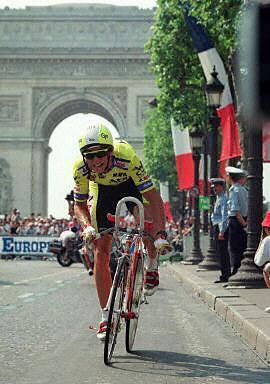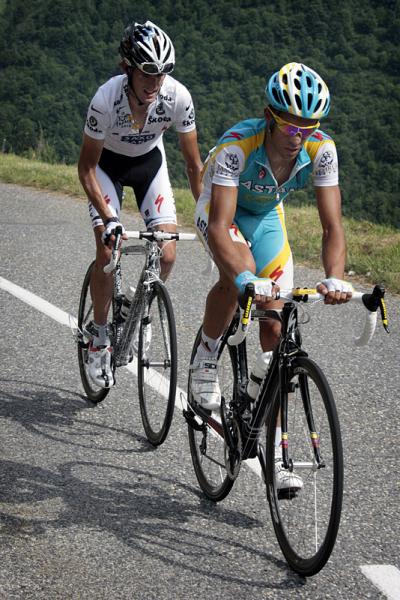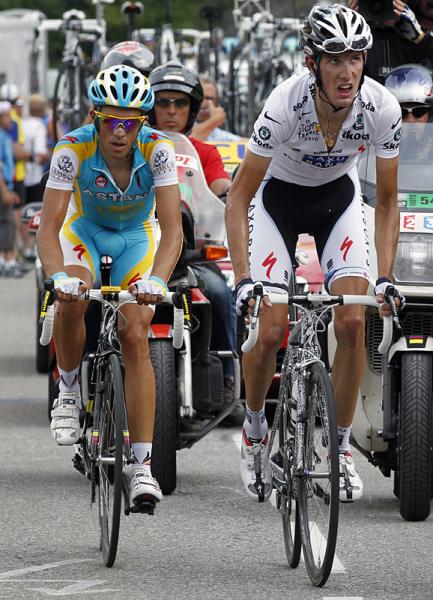Surviving off days and racing to Paris
How the lessons of epic 1989 Tour apply to Schleck and Contador



What a great first week of racing. It is a Tour de France that I would have loved to have raced, so long as I was one of the lucky few that survived all the crashes!
Watching the Tour on TV can be interesting. To hear the commentators talk about Contador's form and how weak or strong he appears to be is great, but it is purely speculation. It is impossible to know how he will be riding next week based on just two mountain stages. Winning the Tour seems simple: ride faster than your competitor every day for three weeks. This is not always possible and does not necessarily translate into victory. Sometimes a rider can just be on an "off" day and seem to be struggling.
In the 1989 Tour De France, I traded the yellow jersey several times with Laurent Fignon. The day before the Alpe D'Huez stage, I was in yellow and made up another 13 seconds on Fignon with a small attack on the Izoard. I was trying to get any time I could on Fignon and took every opportunity to grasp a few more seconds. It seemed like my competitors were more concerned with the next day’s mountain stage than with monitoring the run-in to Briancon as closely as they should have done and I was able to capitalize on that.
The following day was the most critical stage in the Tour. July 19th, the biggest mountain stage of the 1989 Tour de France. I was feeling great over the Galibier, Glandon and Croix de Fer. At the bottom of the final climb of the day, Alpe d’Huez, I was still feeling really good, so good that I attacked the lead group. I was quickly reeled in but gave it another try. Again, they reeled me back only this time the pace continued to increase. All of a sudden, the sensation of power started to fade. I really started to suffer and then began to worry that Fignon would see it in my face. I was hoping I could bluff my way to the finish. Fortunately, Laurent never looked back at that point. If he had done I might well have lost the Tour.
Jose De Cauwer, my ADR coach, saw what was happening too. The ADR car was at the front of the line-up of team cars just ahead of Systeme U’s. Guimard needed to pass De Cauwer to tell Fignon what he was seeing, but De Cauwer did not make that task easy. He and Guimard battled it out, with Guimard eventually passing by. The best description of that day would have been, "Demolition Derby on L'Alpe D'Huez”, with thousands of dollars of damage done to the team cars.
When Guimard finally did get around De Cauwer, he pulled up to Fignon and ordered him to attack. The first time around Fignon could not respond to Guimard's request.
Several kilometres, later Guimard was back. This time he really let Fignon have it. Yelling at the top of his lungs, he again told Fignon to attack. This time Fignon responded and I attempted to follow. Within several metres I was in the red and shortly after I blew up. I am happy that radios were not legal in those days because it probably would have ended differently for me. By the top of Alpe D’Huez I had lost more than a minute and a half and, with it, the overall lead.
If my form had been judged solely on the basis of the climb of the Alpe that day, I would have been counted out for the final run in to Paris. Instead, I was able to recover from that effort and ended up winning two of the next four stages and the Tour itself. After Fignon congratulated me on my second place finish the day before the final time trial, I thought to myself, “holy s**t Laurent, you just lost the Tour”. He had forgotten Guimard’s most important advice: “the race is never over until you cross the finish line”.
Fignon had taken his success in the Alps as an indication of how the race would finish. My performance in the time trial was in keeping with the time trials we had already done against each other at the Giro and earlier in the Tour the same year.
The latest race content, interviews, features, reviews and expert buying guides, direct to your inbox!
Greg LeMond is one of the most important figures in cycling's rich history. A three-time Tour de France winner and double World Champion, LeMond not only reached the pinnacle of his sport, but changed it forever. The first American Tour winner, he brought cycling to new frontiers. A fearless champion of innovation, he ushered in a new era of technological advancement. A stylish and determined rider, he captured the hearts of fans the world over.
Articulate and informed in his opinions, LeMond has always been a forthright advocate of cycling's true values and we are delighted to welcome Greg to the Cyclingnews team for the duration of the Tour de France